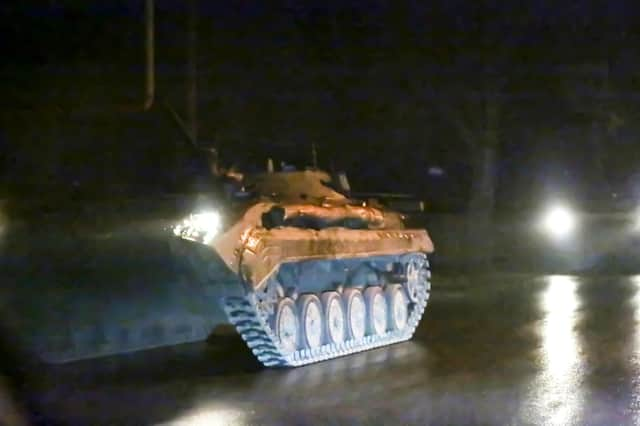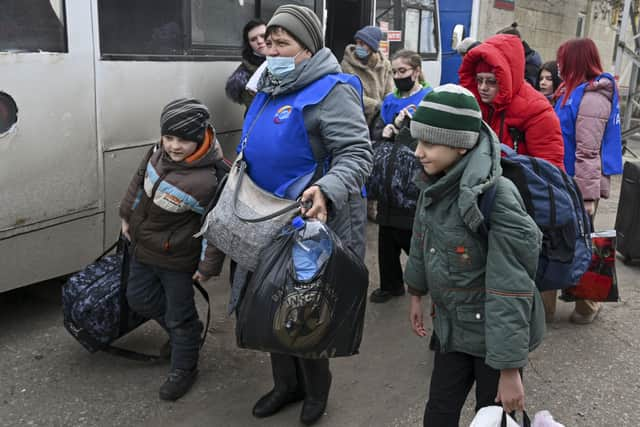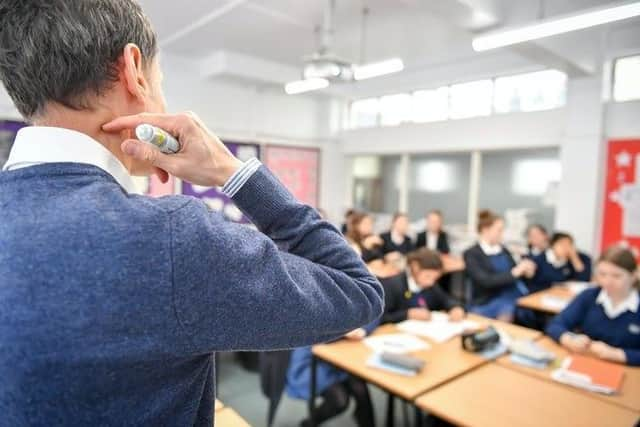Why history lessons have never mattered more in schools as Ukraine crisis escalates – Jayne Dowle


Adapted from a Robert Harris novel, it stars Jeremy Irons as a compellingly complex Neville Chamberlain, the British Prime Minister who attempted to appease Adolf Hitler in the 1930s.
Advertisement
Hide AdAdvertisement
Hide AdSounding familiar? Chamberlain’s diplomatic missions failed of course. One by one, the despotic Nazi leader began to annex and invade European countries, Czechoslovakia, Austria, Poland, … and the rest, as we all know, is history – but do we?


I ask because as the film progressed – and veering between stiff-upper lip English and subtitled German, you must keep your wits about you – the family erupted into fierce debate.
What we knew of this period, we knew well. What we didn’t know was, frankly, shocking and convinced me yet again that the teaching of history in schools has never been more important.
In addition, the argument for combining both history and geography into one ‘humanities’ GCSE has regained strength; you can’t begin to understand one without knowledge of the other. Some schools do offer this as an option, but it’s certainly not mainstream.
Advertisement
Hide AdAdvertisement
Hide AdIf even Foreign Secretary Liz Truss, alumni of Roundhay School in Leeds, with her Oxford PPE (politics, philosophy and economics) degree, can mix up the Baltic and Black seas, more than 700 miles apart, to the delight of Russia’s haughty foreign ministry spokesperson, Maria Zakharova, there are clearly gaps in our knowledge.


I’m speaking as a parent and self-confessed history nerd here, but I believe that the focus of history teaching is becoming both too narrow and so broad that it fails to make cohesive sense.
At a sixth-form college open evening recently, I had a debate with a history teacher. When I asked him to justify why his chosen syllabus veered from the English Civil War to Russia in 1917 to Nazi Germany and the Holocaust with no recent (say from the Industrial Revolution onwards) British social history, he said – and I do not jest – that “the boys like the Nazis”.
What of the girls, I asked – or the boys ‘not so bothered about Nazis’? What of the need for young people to understand their own collective past before they can place into perspective the history of other countries?
Advertisement
Hide AdAdvertisement
Hide AdThe issue is not just of relevance, but retention too. We do learn information at school but fail to recall it. We should embrace discussion of history to keep it alive, instead of closing the lid.
My 16-year-old daughter, Lizzie, is studying Nazi Germany for her GCSE history examination this summer, as did her older brother, Jack.
In those pre-pandemic times, he went on a school trip to Berlin, visiting the Reichstag and a concentration camp, so spoke passionately with first-hand veracity.
Fresh from her half-term revision session (or so she said) Lizzie displayed an impressive recall of facts, and I now have to concede – with my 1986 A-level History knowledge slightly hazy and antediluvian in itself – that she probably knows more about this period than I do.
Advertisement
Hide AdAdvertisement
Hide AdNevertheless, it fell to me to knit together the key points of the First World War and how they related to the causes of the Second.
Along the way Lizzie reminded us of the onerous conditions of the Treaty of Versailles and we touched on the Weimar Republic, using the 1972 musical of Cabaret, starring Liza Minnelli as Sally Bowles, as a handy reference point.
My husband, whose own history teacher had actually fought in the Second World War and never let his comprehensive class forget it, spent most of this part of the discussion lamenting the fact that he didn’t learn anything at school. He did, however, live in Germany for a year in his early 20s, building a power station and spending his weekends clubbing in Berlin with German techno DJs. The world seems huge and unfathomable just now, but these touchstones remind us of our poignant shared human experience.
Once we had established that most of the key First World War players were all first cousins and descendants of Queen Victoria, everything began to fall into place.
Advertisement
Hide AdAdvertisement
Hide AdIt’s all about land and empires in the end, we agreed. And in that, although so much has altered in the world in the century since that hopeful Armistice was signed in 1918, nothing has changed at all.
Support The Yorkshire Post and become a subscriber today. Your subscription will help us to continue to bring quality news to the people of Yorkshire. In return, you’ll see fewer ads on site, get free access to our app, receive exclusive members-only offers and access to all premium content and columns. Click here to subscribe.
Comment Guidelines
National World encourages reader discussion on our stories. User feedback, insights and back-and-forth exchanges add a rich layer of context to reporting. Please review our Community Guidelines before commenting.